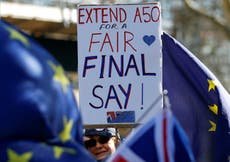Climate change, not Brexit, is the biggest threat to the future of our country – but Theresa May doesn’t care
The usual incremental policy and half measures, as exemplified by Philip Hammond’s proposals in his spring statement just will not do anymore. We need a Green New Deal
Opening the spring statement yesterday, the chancellor spoke of the “cloud of uncertainty hanging over the economy”. He was of course referring to Brexit and he is right that what kind of deal we strike with the European Union will have significant ramifications for the UK economy.
But amidst the chaos of the Brexit votes this week, the spring statement was an opportunity for the government to focus on the long-term challenges facing our economy. And climate change and wider environmental breakdown are the greatest threats to the future stability of our economy and society. Here’s why.
First, climate change poses risks to the stability of our financial system, future economic activity and productivity as the Bank of England itself has made clear. A recent report from the Institute for Public Policy Research (IPPR) demonstrated that the consequences of environmental breakdown globally potentially include drought, famine and increased ill health. The increased incidence of these issues could destabilise nations and entire regions thereby leading to instability, large-scale involuntary migration, conflict and even the potential collapse of social and economic systems. Much of this may not occur in the UK in the first instance, but it will have significant consequences for it nevertheless.
Second, the consequences of climate change and environmental breakdown will fall hardest on the poorest who are most vulnerable to its effects and least responsible for the problem. Globally, per capita emissions of the wealthiest 10 per cent are up to five times higher than those of the bottom half. Furthermore, the transition to a net zero economy if badly managed could risk the burden falling on those who are least able to bear it. The gilet jaunes protests in France are an example of what happens if insufficient consideration is given to the impacts of climate policies on the poorest.
To be fair to the government, yesterday’s spring statement was “greener” than most fiscal events in recent years, proposing to introduce a Future Homes Standard and mandate the end of fossil-fuel heating systems in all new homes from 2025 (although ironic given the government scrapped the zero-carbon homes standard back in 2015); increase the proportion of green gas in the grid and to launch a review of the link between biodiversity and economic growth.
Nevertheless, as a package, these measures are simply not adequate to the scale of the challenge that we face. Last year, the experts from the International Panel on Climate Change (IPCC) said that limiting global warming to 1.5°C required rapid, far-reaching and unprecedented changes in all aspects of society. While the UK has made progress, we are not currently on track to meet our statutory climate targets and our global environmental footprint is unsustainable.
The problem with our current approach was highlighted by the chancellor’s own statement yesterday. He argued that young people needed to be convinced that our current economic model is the solution to problems like climate change. Whereas in reality, it is the reverse and politicians like Philip Hammond and Theresa May need to recognise that it is our current economic model that is the problem. We cannot sustain either prosperity or justice within our economy if climate change and environmental breakdown continue on their present course - and our current model is the cause. So, what can be done?
First, we need a sustainable economy act. Building on the model of the climate change act, the proposal from IPPR’s Commission on Economic Justice would put legal requirements on the government to set environmental limits on areas such as air pollution, soil degradation and biodiversity loss. If introduced, the UK would be the first country in the world to legislate to bring its economy within sustainable limits.
Second, we need to elevate the challenge of decarbonising our economy and tackling environmental breakdown to a national mission. That will mean an economic mobilisation at an unprecedented scale and pace. As argued by many others, the idea of a “Green New Deal”, though it needs to be fleshed out, provides just that promise. An investment programme and industrial strategy that could radically reduce our emissions, deliver broadly-distributed prosperity, and deliver well-paid, high quality jobs. Those seeking a real “Project After” Brexit need not look any further than a Green New Deal.
Third, we’ll need politicians at all levels to take much bolder decisions and show the same kind of leadership now being demonstrated by the young climate strikers who will continue to take to the streets until something is done. The usual incremental policy and half measures, as exemplified by Philip Hammond’s proposals in his spring statement just will not do.
The chancellor claimed yesterday to have heard the voice of young people on what is undoubtedly the greatest challenge of our generation. But on the evidence of what he announced, he largely ignored them. With young people taking to the streets again tomorrow, that’s increasingly unsustainable.
Luke Murphy is the associate director for Energy and Climate at IPPR





Join our commenting forum
Join thought-provoking conversations, follow other Independent readers and see their replies